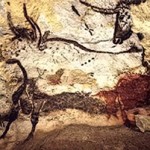 These are the words – flicker and peep – for the play of light and shadow, for the sound of sound, in the felt senses. Waking early, in the cold and dark, I notice flames dancing and crackling in the fireplace now. Outside, coyotes yip-whoop in starlight. Time collapses between aboriginal and modern.
These are the words – flicker and peep – for the play of light and shadow, for the sound of sound, in the felt senses. Waking early, in the cold and dark, I notice flames dancing and crackling in the fireplace now. Outside, coyotes yip-whoop in starlight. Time collapses between aboriginal and modern.
The resonance of flicker deepened beautifully, weeks ago, when I read about cave paintings in France – newly discovered ones. The miracle of technology let me watch a mini-movie of humans admiring the bison painted on uneven surfaces, speculating that in the dancing light of a fire, in a hypnagogic state, observers thousands of years ago may’ve experienced the bison moving: our first movies, as a race, although the pictures inevitably danced in hearts and minds around the fires, in the songlines, before there was painting.
Peep deepened when I discovered pipe springs from the sound-copying word peep, our attempt to mimic birdsong with a flute, to contain and shape a passage for the movement of air.
This inner “sound and light show” brings up a dilemma: for months, I’ve responded to a lifelong love of movies by entering (again) the machinery of making them. Extreme reading, drafting, film-going and workshopping, all in an impulse to generate similar delight for others, crescendoed a few days ago. I faced an strange paradox: decades of meditation had aimed at transcending reactivity to flicker and peep, dissolving drama in all forms. Suddenly, I realized I’d been investing everything in what I supposedly yearned to be beyond.
I still love the cinematic art form, and marvel at real artistry when I experience it, but the drama-gears are getting quieter by the day. Aristotle said the pity and fear aroused by drama are cathartic, but now I’m wondering if stimulation of these vibrations actually cements the memes in place, replicates them, affirms them as the perpetual inevitable human condition and thus locks us longer in their faux prisons.
Maybe the new dramas will be in some ways supra-human: Nature-mythology is resurgent, for example. Joseph Campbell’s work reveals a potent awe of the mysteries of Nature, a subtle yet total excitement in self-sensing as a participant in it. Among his parting recommendations were suggestions that the new mythologies need to be about this – about all humanity, as a body, experiencing itself as an integral part of the natural world.
Thousands of years after the flickering dramas on cave walls, humanity watches and listens – through scatterings of electrons beamed around the planet into viewing screens – while Nature changes dramatically. This may be the new drama.